 1-800-805-5783
1-800-805-5783 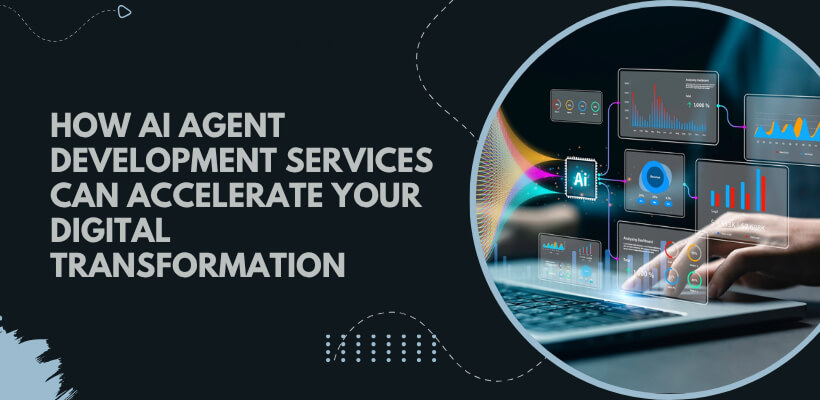
Digital transformation isn’t just about moving to the cloud or launching an app. It’s about rethinking how your business works, making it faster, more intelligent, and more connected. That’s where AI agent development services come in.
These services help you build innovative, adaptive systems that don’t just automate tasks, they understand goals, learn from feedback, and collaborate with users and tools. If you’re searching for AI-powered business automation, this is where you start.
Companies are already witnessing significant returns. Intelligence-infused processes are on track to grow to 25% in 2026, an 8x increase in just two years, and AI-enabled workflows have tripled in profit contribution, improving operating profit by 7.7% in 2024.
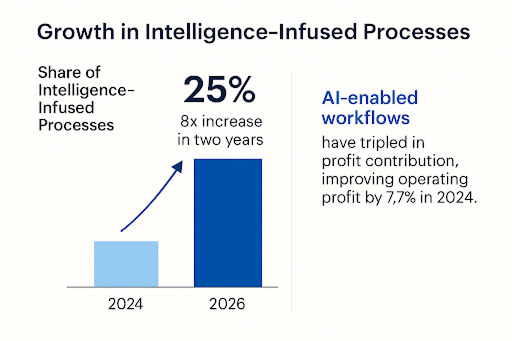
AI agents are software programs that work toward specific goals. They analyze data, make decisions, and perform actions without needing constant human supervision. Some schedule meetings. Others write reports, sort emails, or manage inventories.
And when you use multiple agents together, you create a multi-agent AI system. These agents collaborate, assign tasks among themselves, and adjust in real time. It’s like having a digital team that works around the clock.
Businesses are increasingly turning to custom AI agent development services to meet specific needs, from lead scoring to predictive maintenance.
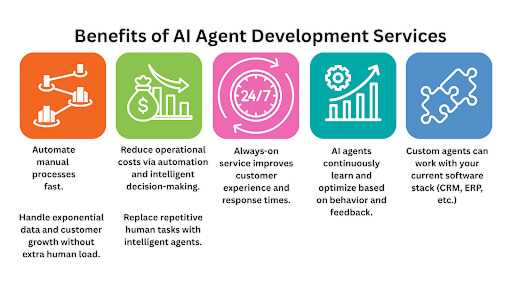
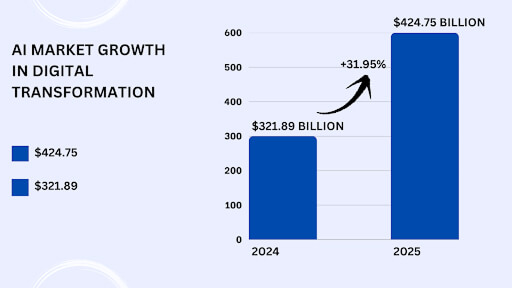
Digital transformation demands more than speed. It requires flexibility. AI agents development services give you that edge by acting autonomously and evolving with your operations.
The market for AI in digital transformation is experiencing exponential growth, reaching $321.89 billion in 2024 and projected to hit $424.75 billion in 2025, with a staggering CAGR of 32%.
This isn’t just theory;
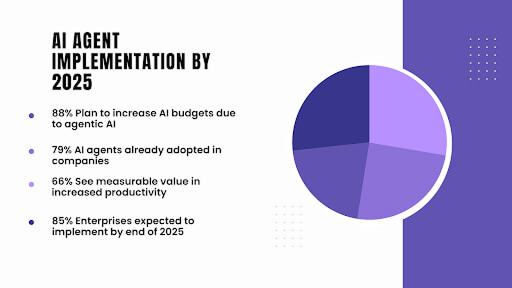
Need to reroute customer support tickets or flag urgent approvals? AI agents don’t wait for instructions, they act when the data changes. That’s why AI agent development services for businesses are growing in demand.
“AI agents allow us to move from reactive operations to predictive strategy,” says Dr. Neha Batra, Head of Intelligent Systems at MIT CSAIL.
From invoice approvals to email categorization, these agents handle repetitive tasks. That frees your team to focus on strategy and innovation.
AI agents remember context, learn preferences, and adjust their tone. This kind of real-time response is precisely what digital-first customers expect today.
Want Slack alerts from your CRM? Or pricing updates from your competitor’s website directly into a dashboard? Agents handle that quietly in the background.
Let’s break down how different sectors use AI agent systems in real-world operations.
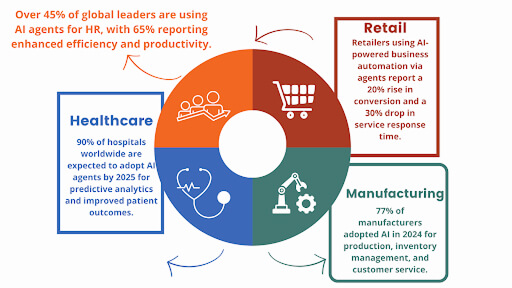
Example:
HDFC Bank uses AI agents to streamline tractor loan processing. Agents handle ID verification, land ownership checks, and eligibility scoring, cutting approval times in half.
90% of hospitals worldwide are expected to adopt AI agents by 2025 for predictive analytics and improved patient outcomes.
Retailers using AI-powered business automation via agents report a 20% rise in conversion and a 30% drop in service response time.
77% of manufacturers adopted AI in 2024 for production, inventory management, and customer service.
Over 45% of global leaders are using AI agents for HR, with 65% reporting enhanced efficiency and productivity. Unilever, for example, saved over $1 million per year in recruiting and reduced time-to-hire by 75%.
These examples show the benefits of multi-agent AI systems across every vertical.
If you’re considering working with AI agent development services, here’s what to check:
Top teams use agentic frameworks like CrewAI, LangChain, or Microsoft AutoGen. These speed up deployment and ensure stability.
The best AI agent development services are never generic. Look for providers who build around your workflows, your tools, and your goals.
Ask for case studies. Ask for metrics. Reliable AI agent development services will be able to show tangible business outcomes.
Good agents explain their decisions. That’s key for audits, customer trust, and compliance.
Tip: Use this checklist when evaluating a top AI agent development services provider.
Instead of one innovative tool, you get a team of them. Each agent handles a part of your workflow. They talk to each other. They solve problems together.
That’s the power of a multi-agent AI system.
Example:
In an e-commerce business, one agent tracks trending products. Another adjusts pricing. A third monitors logistics. These agents collaborate to keep operations fast and the customer experience smooth.
The benefits of multi-agent AI systems include higher speed, smarter coordination, and the ability to handle complex decisions without adding more staff.
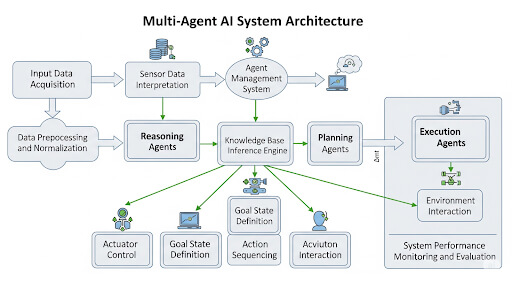
The real value of AI agent development services lies not just in what they automate today, but in how they evolve tomorrow.
Unlike static automation tools, modern AI agent development services are designed to learn. Through reinforcement learning, they improve performance over time based on feedback. Every customer interaction, system alert, or outcome helps them refine their decisions.
Example: A support agent initially routes tickets based on basic keywords. Over time, it learns which tickets get escalated, which responses resolve fastest, and adapts its logic accordingly, without manual reprogramming.
Adaptability is a differentiator. In fast-moving industries, static tools fall behind. Adaptive AI agents, on the other hand, thrive under changing conditions, including new policies, shifting customer behavior, or market volatility.
That’s why companies investing in AI agent development services gain more than just efficiency. They build infrastructure that evolves, one that learns, responds, and scales with the business.
Implementing AI agent development services today sets the foundation for long-term digital transformation. It improves data collection, normalizes automation culture, and strengthens your integration ecosystem.
You’re not just solving one problem, you’re training your systems and teams to think in terms of intelligence, not just process.
In short: You’re not just automating. You’re future-proofing.
You don’t need a massive rollout. Start with one task: automate lead qualification, summarize reports, or route customer inquiries.
Within weeks, you’ll start seeing time savings and better consistency.
Then, scale up.
As Dr. Tomas Mikolov of DeepMind says, “Intelligent agents aren’t replacing people. They’re replacing repetitive decisions.”
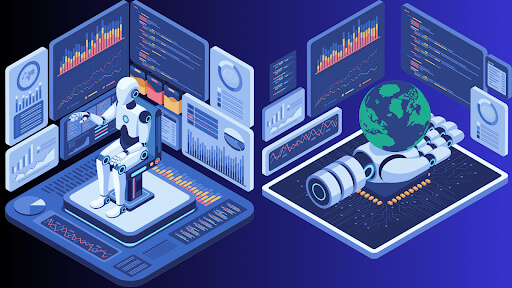
Digital transformation isn’t just about speed. It’s about intelligence. If your systems can’t learn, adapt, or collaborate, they’re holding you back.
AI agent development services help businesses make that leap. With the proper support, you can build systems that work smarter, respond faster, and free up your people for what matters.
Now’s the time to invest in the future, not in theory, but in working AI systems built for your business.
They help you create smart software agents that automate tasks and make intelligent decisions.
2. What makes the best AI agent development services stand out?
Look for customization, proven frameworks, measurable impact, and transparent agent logic.
3. How do AI agents help in digital transformation?
They reduce manual tasks, connect systems, and make adaptive decisions that keep your business agile.
4. Can multi-agent systems be used in small businesses?
Yes. Start small, automate one workflow. You don’t need a full suite to get value fast.
At [x]cube LABS, we craft intelligent AI agents that seamlessly integrate with your systems, enhancing efficiency and innovation:
Integrate our Agentic AI solutions to automate tasks, derive actionable insights, and deliver superior customer experiences effortlessly within your existing workflows.
For more information and to schedule a FREE demo, check out all our ready-to-deploy agents here.